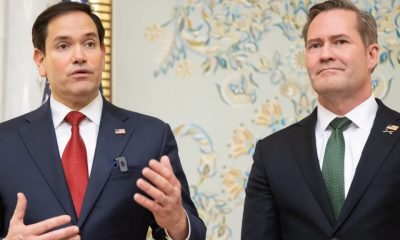International
U.S., allies plan for long-term isolation of Russia
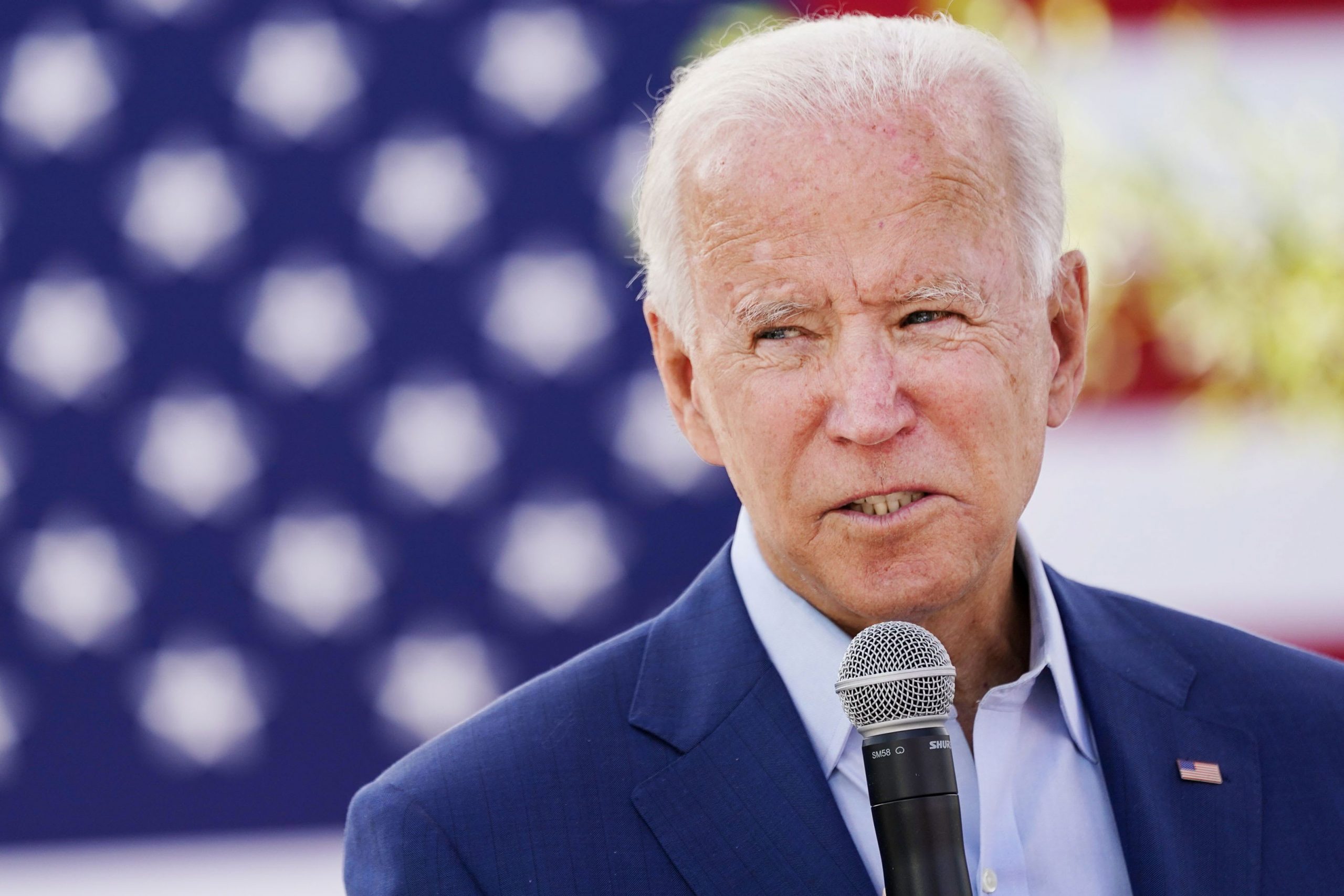
Nearly two months into Vladimir Putin’s brutal assault on Ukraine, the Biden administration and its European allies have begun planning for a far different world, in which they no longer try to coexist and cooperate with Russia, but actively seek to isolate and weaken it as a matter of long-term strategy.
At NATO and the European Union, and at the State Department, the Pentagon and allied ministries, blueprints are being drawn up to enshrine new policies across virtually every aspect of the West’s posture toward Moscow, from defense and finance to trade and international diplomacy.
Outrage is most immediately directed at Putin himself, who President Biden said last month “can’t remain in power.” While “we don’t say regime change,” said a senior E.U. diplomat, “it is difficult to imagine a stable scenario with Putin acting the way he is.”
But the nascent new strategy goes far beyond the Kremlin leader, as planners are continuing to revise seminal documents that are to be presented in the coming months. Biden’s first National Security Strategy, legally required last year but still uncompleted, is likely to be significantly altered from initial expectations it would concentrate almost exclusively on China and domestic renewal. The Pentagon’s new National Defense Strategy, sent last month in classified form to Congress, prioritizes what a brief Pentagon summary called “the Russia challenge in Europe,” as well as the China threat.
NATO’s first Strategic Concept document since 2010, when it sought a “true strategic partnership” with Russia, will be unveiled at the alliance summit in June. “Meaningful dialogue, as we strived for before, is not an option for Russia,” NATO Secretary General Jens Stoltenberg said at a news conference early this month.
READ ALSO:
- ‘Inhuman’ situation in Ukraine’s Mariupol as Russia claims almost full control
- Herdsmen Not Behind Benue Latest Attack – Military
- MNJTF rains multiple missiles on ISWAP Commanders, training camps
The European Union has drawn up plans to cut its heavy dependency on Russian gas by two-thirds by the end of this year, and end all fossil fuel imports from Russia before 2030. “It is not so much about sanctions, but it is about articulating a path to zero, making sure that we become independent of Russian gas and oil,” Dutch Foreign Minister Wopke Hoekstra said in a forum Thursday at the Center for Strategic and International Studies in Washington.
“For some, that will be a trajectory of months. For others, it might be years. But the Netherlands and other countries are dead serious about this,” Hoekstra said. “Never again the same mistake.”
Allies have announced major defense budget increases stretching far into the future. Finland and Sweden are expected to apply for NATO membership ahead of the June summit in Madrid, a significant shift in the balance of European security that would also sharply increase the alliance’s military presence near Russia.
A week ago, Biden signed bills ending normal trade relations with Russia and codifying his U.S. ban on Russian oil imports. Last week, the United Nations General Assembly voted to suspend Russia’s membership from the U.N. Human Rights Council, and a long-simmering movement to revise the membership and powers of the Security Council, where Russia freely uses its veto power, gained new impetus.
Few Western leaders are willing to venture a guess as to when, and how, the Ukraine crisis will play out. Many of the proposed changes “can’t be fully decided until we know how this conflict ends,” said Alexander Vershbow, a former U.S. ambassador to Russia, senior Pentagon official and deputy NATO secretary general. “Does it end?” Or does it drag on with an uneasy cease-fire, with “no war, no peace, for several years?”
But the long-term strategy is being drawn up even as the allies address the immediate crisis with escalating sanctions against Moscow, weapons aid to Ukraine, and the deployment of tens of thousands of their own troops to NATO’s eastern border. Many of those measures and more are now expected to stay permanently in place, according to public leader statements and conversations with eight senior U.S. and foreign officials, some of whom spoke on the condition of anonymity to discuss closed-door planning.
“At the end of the day, what we want to see is a free and independent Ukraine, a weakened and isolated Russia and a stronger, more unified, more determined West,” Biden national security adviser Jake Sullivan said last Sunday on NBC’s “Meet the Press.” “We believe that all three of those objectives are in sight.”
Some have questioned both the wisdom of the plans and the staying power of the West, advising against a return to the “containment” policy that governed relations with the Soviet Union. Others have said the Ukraine crisis, and its profound effect on Europe, offer an opportunity for the United States to withdraw from at least some of its expensive, self-assumed responsibilities to defend the free world.
READ ALSO:
- Man, 40, defiles brother’s daughter, gags mouth with pillow
- Man arrested for for ‘stealing’ two children in church
- Why Wike can’t criticise Buhari over state pardon -Presidency
“If anything,” historian Stephen Wertheim argued this month in Foreign Affairs magazine, “the war has strengthened the case for strategic discipline, by offering a chance to encourage Europe to balance against Russia while the United States concentrates on security in Asia and renewal at home.”
Not everyone favors the long-term isolation of Moscow. In France, where President Emmanuel Macron is locked in a surprisingly close reelection race with the surging candidacy of Marine Le Pen, she has called for reconciliation between NATO and Russia and has reiterated a pledge to pull France out of the alliance’s integrated command. And there are voices in Germany in favor of keeping the door open to dialogue with the Kremlin to facilitate an eventual rapprochement.
In the United States, the issue is one of the few in which Biden has strong bipartisan support. Backing for a tough line against Russia appears also to have subdued Republican disdain for NATO, a hallmark of the Trump administration, as alliance members from Washington to Russia’s western border insist that the need for, and the reality of, a common stand is higher than ever before.
But if the immediacy of Ukraine dissipates, along with daily images of new horrors there, disagreements inevitably will arise over increased defense spending, the need to engage with Russia on issues such as nonproliferation, charges that attention is being pulled away from China, and disruptions of trade that bring rising prices at home that disrupt the president’s domestic agenda.
“We must commit now to be in this fight for the long haul,” Biden said during a visit to Warsaw last month, outlining the fight as one between democracy and autocracy. “We must remain unified today and tomorrow and the day after and for the years and decades to come. It will not be easy. There will be costs.”
The last major overhaul of relations with Russia, guiding hopes after the collapse of the Soviet Union, came in 1997, when NATO leaders and Moscow approved the “Founding Act on Mutual Relations, Cooperation and Security.” Reflecting “the changing security environment in Europe, … in which the confrontation of the Cold War has been replaced with the promise of closer cooperation among former adversaries,” it said they would act together to build “a lasting and inclusive peace in the Euro-Atlantic Area.”
As it sought to tie Russia to interdependency, the Founding Act included specific commitments to respect states’ sovereignty, peacefully settle disputes, and, on NATO’s part, an intention to avoid any additional permanent stationing of “substantial combat forces” on Russia’s borders. It also specifically said it was not intended to “delay, limit or dilute NATO’s opening for the accession of new members.”
READ ALSO:
- Saboteurs Hold Nigeria Hostage As Power Grid Collapsed 115 Times In 9 Years
- We’ll wipe out those who killed 21 persons in Benue — Chief of Defence State
- How Osinbajo rejected offer to be Obasanjo’s minister – Ogunsakin
In subsequent years, those commitments were often tested, most recently before the current crisis by Russian’s 2014 invasion of parts of eastern Ukraine and annexation of Crimea, and resulting Western sanctions. But even after those events, Europe and the United States eased back into a relationship with Russia, either out of economic imperatives, as with Europe’s energy imports, or out of desire, as when former president Donald Trump bragged about his deep bond with Putin.
But at an emergency NATO summit last month, “leaders agreed to reset our deterrence and defense for the long term,” Stoltenberg said. “To face a new security reality” with substantially more forces in the east, more jets in the skies and more ships at sea. Russia has “walked away” from the Founding Act, he said later. “That doesn’t exist any more.”
A senior European official said that “the one lesson we take away from a Russian aggression that many thought could not be possible, is that here is a country that is ready to do something that no security guarantee or even plausible expectation [can ensure] that it can’t happen again.”
“We thought interdependence, connectiveness, would be conducive to stability because we had correlating interests. Now, we’ve seen this is not the case. Russia was highly connected with Europe, a globalized country.” the official said. “Interdependence, we’ve now seen, can entail severe risks, if a country is ruthless enough. … We have to adapt to a situation that is absolutely new.”
Several European policymakers said their current calculations are shaped by two major factors. The first is the expectation that any truce in Ukraine is likely to be temporary. Even if Putin agrees to lay down arms for the moment, many Europeans believe he will seek to regroup, rebuild the Russian military and attack again once he feels ready.
The second is a deep horror at the Russian military’s atrocities against civilians that have come to light since its forces pulled back toward eastern Ukraine in the past two weeks. Many believe Putin himself may need to face war crimes charges in front of international tribunals.
The combination means many Europeans feel their continent will be unstable and insecure so long as Putin is in the Kremlin. And if they are not yet willing to embrace an active effort to oust his regime, support is growing there, as well as in the United States, to permanently cut off his country.
“There is growing realization that this is a long-term situation and that a strategy of containment, a strategy of defense, is forming,” Latvian Foreign Minister Edgars Rinkevics said in an interview. “Support Ukraine as much as you can, sanction Russia as much as you can, do as much as you can do to reduce dependence on Russia however you can and finally, yes, put more emphasis on military defense.”
Rinkevics was among the E.U. foreign ministers who had breakfast in Luxembourg this week with the chief prosecutor of the International Criminal Court to discuss war crimes.
“When it comes to the investigation of all the war crimes, it cannot stop at the field commander, and in Russia, the ultimate commander in chief is the president of the Russian Federation,” Rinkevics said. “The feeling after Bucha,” the Kyiv suburb where withdrawing Russian troops left scores of dead civilians in the streets, some apparently tortured and executed, “is that it will be very difficult to speak with Putin or anyone in the Russian government without remembering what happened.”
Apparently strong backing for the war among Russians has also caused a recalculation among allied policymakers about a long-standing effort to draw a distinction between the country’s population and its leadership, said Lithuanian Vice Defense Minister Margiris Abukevicius. Russians appear to have the leaders they want, he said — another reason to dig in and prepare for a long standoff.
“There is collective responsibility,” Abukevicius said. “At the beginning, we were saying ‘Putin’s war.’ Now, we are more and more saying ‘Russia’s war.’”
THE WASHINGTON POST
International
Israel admits mistakes over medic killings in Gaza
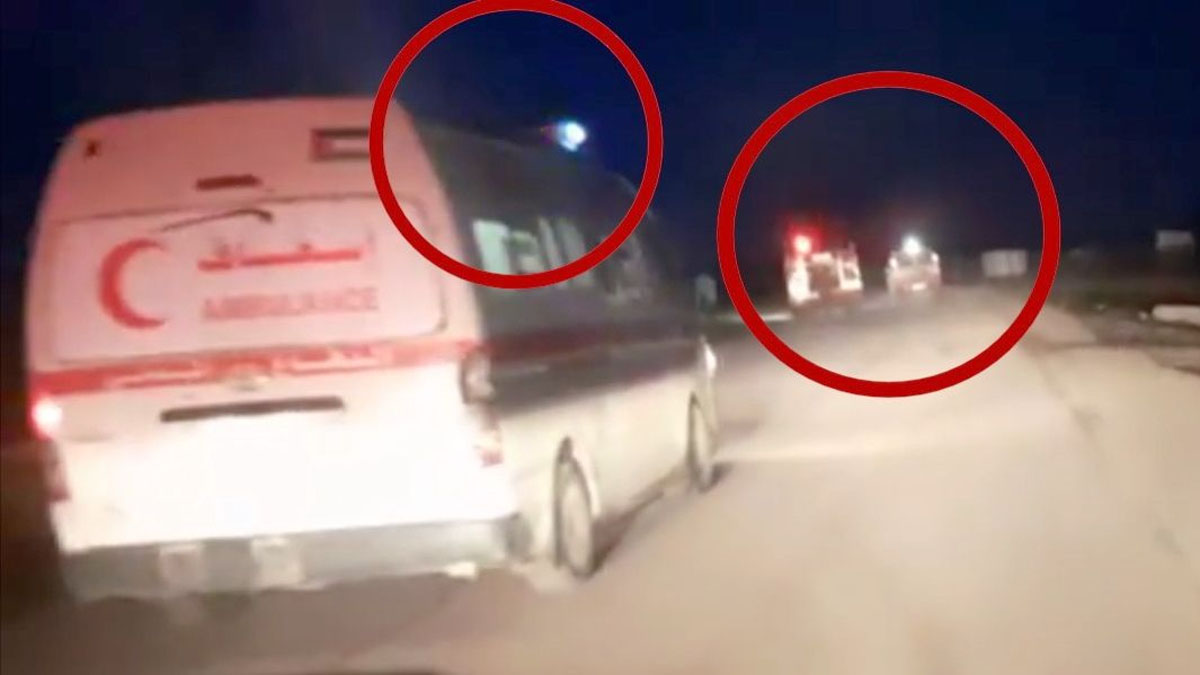
Israel admits mistakes over medic killings in Gaza
Israel’s army has admitted its soldiers made mistakes over the killing of 15 emergency workers in southern Gaza on 23 March.
The convoy of Palestinian Red Crescent Society (PRCS) ambulances, a UN car and a fire truck from Gaza’s Civil Defence came under fire near Rafah.
Israel originally claimed troops opened fire because the convoy approached “suspiciously” in darkness without headlights or flashing lights. It said movement of the vehicles had not been previously co-ordinated or agreed with the army.
Mobile phone footage, filmed by one of the paramedics who was killed, showed the vehicles did have lights on as they answered a call to help wounded people.
The Israel Defense Forces (IDF) insists at least six of the medics were linked to Hamas – but has so far provided no evidence. It admits they were unarmed when the soldiers opened fire.
The mobile video, originally shared by the New York Times, shows the vehicles pulling up on the road when, without warning, shooting begins just before dawn.
The footage continues for more than five minutes, with the paramedic, named as Refat Radwan, heard saying his last prayers before the voices of Israeli soldiers are heard approaching the vehicles.
READ ALSO:
- I’m holier than you, Lizzy Anjorin tackles gospel artiste Tope Alabi
- Death of pregnant woman denied hospital care worries Lagos govt
- Ancelotti laments after Valencia beat Real Madrid
An IDF official briefed journalists on Saturday evening, saying the soldiers had earlier fired on a car containing three Hamas members.
When the ambulances responded and approached the area, aerial surveillance monitors informed the soldiers on the ground of the convoy “advancing suspiciously”.
When the ambulances stopped beside the Hamas car, the soldiers assumed they were under threat and opened fire, despite no evidence any of the emergency team was armed.
Israel has admitted its earlier account claiming the vehicles approached without lights was inaccurate, attributing the report to the troops involved.
The video footage shows the vehicles were clearly marked and the paramedics wore reflective hi-vis uniform.
The soldiers buried the bodies of the 15 dead workers in sand to protect them from wild animals, the official said, claiming the vehicles were moved and buried the following day to clear the road.
They were not uncovered until a week after the incident because international agencies, including the UN, could not organise safe passage to the area or locate the spot.
When an aid team found the bodies they also discovered Refat Radwan’s mobile phone containing footage of the incident.
The Israeli military official denied any of the medics were handcuffed before they died and said they were not executed at close range, as some reports had suggested.
Earlier this week, a surviving paramedic told the BBC the ambulances had their lights on and denied his colleagues were linked with any militant group.
The IDF promised a “thorough examination” of the incident, saying it would “understand the sequence of events and the handling of the situation”.
The Red Crescent and many other international organisations are calling for an independent investigation.
Israel renewed its aerial bombardment and ground offensive in Gaza on 18 March after the first phase of a ceasefire deal came to an end and negotiations on a second phase stalled.
More than 1,200 people have since been killed in Gaza since then, according to the territory’s Hamas-run health ministry.
The Israeli military launched a campaign to destroy Hamas in response to an unprecedented cross-border attack on 7 October 2023, in which about 1,200 people were killed and 251 were taken hostage.
More than 50,600 people have been killed in Gaza since then, according to the territory’s health ministry.
Israel admits mistakes over medic killings in Gaza
BBC
International
Thousands protest in Spain over nationwide housing crisis
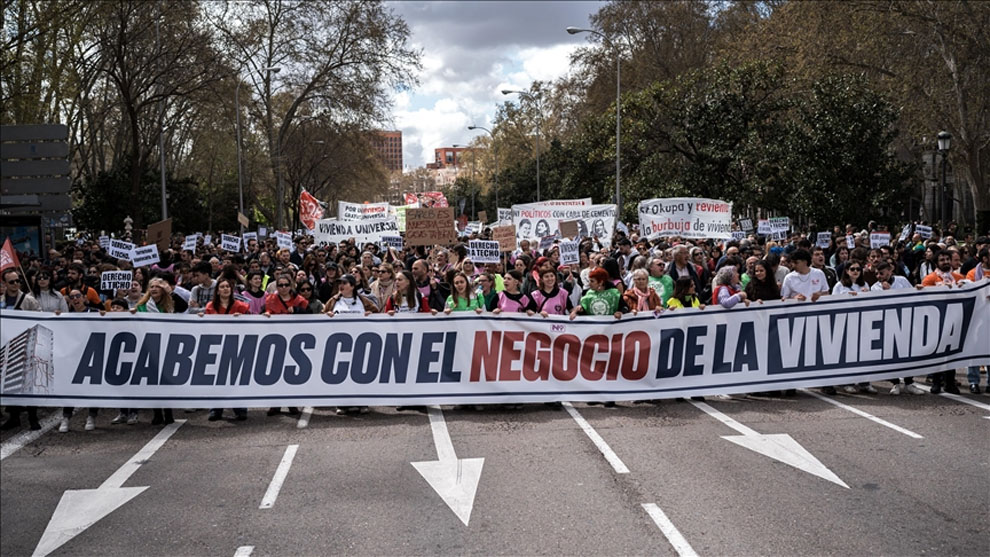
Thousands protest in Spain over nationwide housing crisis
Tens of thousands of Spaniards took to the streets in 40 cities across the country on Saturday to protest housing speculation.
“Housing should be a right, not a commodity for speculation,” protest organizers said.
“However, investment funds and landlords continue to accumulate profits while thousands of people are evicted, displaced from their neighborhoods, or forced to live in inhumane conditions.”
Media reports said around 150,000 protesters showed up in Madrid, while protest organizers claimed another 100,000 people turned out in Barcelona.
The organizers — a collection of tenants’ rights and left-leaning organizations — accuse the government of turning housing “into a business model.”
The protest, which took place under the motto, “Let’s End the Housing Business,” focused on Spain’s housing crisis, with organizers demanding forced rent reductions, expropriation and the creation of more social housing.
“Exhorbitant rents,” they write, “are the main cause of impoverishment of the working class and a barrier to accessing housing.” They accuse a small minority of property owners of “suffocating a large part of society.”
READ ALSO:
- Breaking: Former Oyo governor Olunloyo dies at 89
- Anti-Trump protesters gather in cities across the US
- Ex-Ogun council chair Oladunjoye’s death a huge loss, says Gov Abiodun
Spaniards rally against housing crisisTo view this video please enable JavaScript, and consider upgrading to a web browser that supports HTML5 video
Spain’s history of real estate speculation and its lack of completed affordable housing over the past decade have caused rents to double during that time.
Foreign ownership of properties and tourism have supercharged the problem. As tourism explodes across Spain, locals in Barcelona, Madrid, Malaga, Mallorca and Valencia have been priced out of the market by visitors and the real estate speculators catering to them.
Rents in Barcelona, for instance, have increased 60% in just the past five years. The city has now decided to phase-out all short-term apartment rental licenses by 2028.
Spaniards spending over 40% of income on rent alone Spain’s government estimates it needs to build at least 600,000 new apartments to get a handle on what it calls “a social emergency.” In 2024, 100,000 new homes were completed.
But organizers like Gonzalo Alvarez of the Tenants’ Syndicate (Sindicato de Inquilinas e Inquilinos) said “there is a lack of housing because homes are being hijacked — on the one hand tourist flats, and on the other hand all the empty flats belonging to vulture funds and the banks. So there’s no need to build more, it’s not necessary.”
Instances in which investors allow apartments to fall into disrepair to evict renters has become a common problem, meaning that many tenants are forced to live in squalid conditions because landlords refuse to maintain properties with an eye to increasing prices down the road.
Spain has an abundance of abanoned or unfinished homes that protesters say should be used to alleviate the country’s housing problemImage: Oscar Del Pozo/AFP/Getty Images Spain’s Central Bank recently reported that 40% of renters spend around 40% of their total income on housing. And despite salaries rising by 20% over the past 10 years, these have failed to keep pace with doubling rents. This has made housing the number one concern occupying Spanish voters.
Opponents of the protest movement see measures like the threat of rent strikes as hostile and escalatory, accusing organizers of being radical leftists opposed to the idea of private property ownership while masquerading under the guise of supporting housing equity.
Spain’s Socialist Prime Minister Pedro Sanchez has imposed rent caps as well as proposing bans and/or so-called 100% supertaxes on foreign property ownership as a way to tackle the problem.
At a recent ribbon-cutting ceremony for social housing units in Sevilla, Sanchez said Spaniards, “want us to act, they want the housing market to operate according to the law of reason, of social justice: they want to insure that vulture funds and speculators are not doing whatever they like.”
On Saturday, tenants amplified their calls for slashing rents, the revamping of 3.8 million vacant homes, the banning of eviction companies and the establishment of eviction protections for those who have no alternative housing.
Thousands protest in Spain over nationwide housing crisis
International
Anti-Trump protesters gather in cities across the US
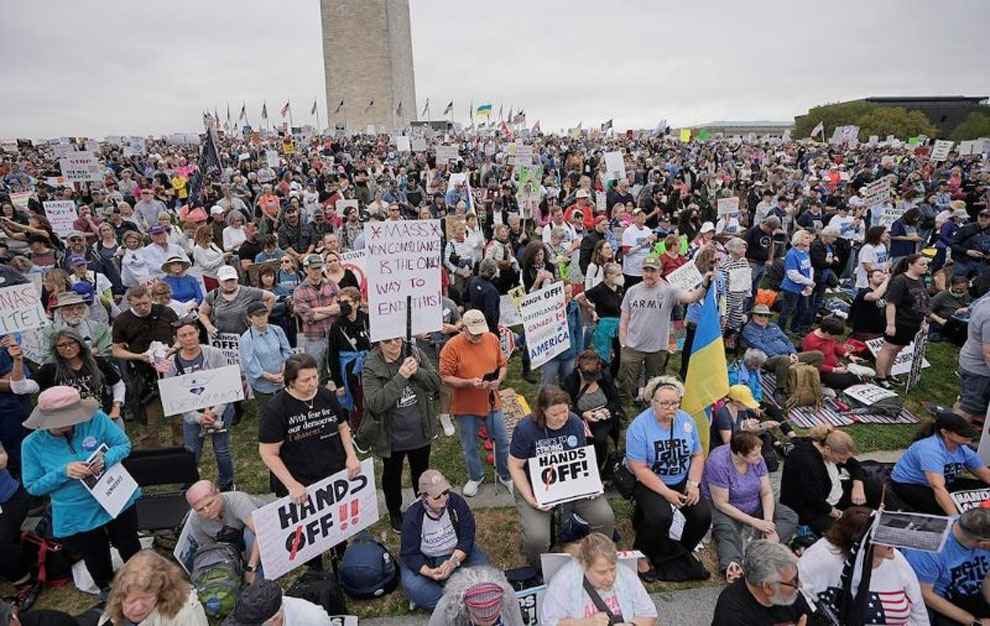
Anti-Trump protesters gather in cities across the US
Crowds of protesters have gathered in cities across the US to denounce President Trump, in the largest nationwide show of opposition since the president took office in January.
The “Hands Off” protest planners aimed to hold rallies in 1,200 locations, including in all 50 US states. Thousands of people turned out in Boston, Chicago, Los Angeles, New York and Washington DC, among other cities, on Saturday.
Protesters cited grievances with Trump’s agenda ranging from social to economic issues.
Coming days after Trump’s announcement that the US would impose import tariffs on most countries around the world, gatherings were also held outside the US, including in London, Paris and Berlin.
In Boston, some protesters said they were motivated by immigration raids on US university students that have led to arrests and deportation proceedings.
Law student Katie Smith told BBC News that she was motivated by Turkish international student Rumeysa Ozturk, whose arrest near Boston-area Tufts University by masked US agents was caught on camera last month.
“You can stand up today or you can be taken later,” she said, adding: “I’m not usually a protest girlie.”
In London, protesters held signs reading, “WTAF America?”, “Stop hurting people” and “He’s an idiot”.
READ ALSO:
- Ex-Ogun council chair Oladunjoye’s death a huge loss, says Gov Abiodun
- Poisonous fluorides in toothpaste: Pharmacists counter televangelist’s claims
- Police raid criminal camps, recover food items in Anambra
They chanted “hands off Canada”, “hands off Greenland” and “hands off Ukraine”, referencing Trump’s changes to US foreign policy. Trump has repeatedly expressed interest in annexing Canada and Greenland. He also got into a public dispute with Ukrainian President Volodymyr Zelensky and has struggled to negotiate a peace deal between Ukraine and Russia.
In Washington DC, thousands of protesters gathered to watch speeches by Democratic lawmakers. Many remarks focused on the role played in Trump’s administration by wealthy donors – most notably Elon Musk, who has served as an advisor to the president and spearheaded an effort to dramatically cut spending and the federal workforce.
Florida Congressman Maxwell Frost denounced the “billionaire takeover of our government”.
“When you steal from the people, expect the people to rise up. At the ballot box and in the streets,” he shouted.
The protests come after a bruising week for the president and his allies. Republicans won a closely watched special Florida congressional election on Tuesday, but with slimmer margins than they had hoped. Wisconsin voters elected a Democratic judge to serve on the state supreme court, roundly rejecting a Musk-backed Republican candidate by almost 10 percentage points.
In both states, Democrats sought to tap into voter anger towards the Trump administration’s policies and Elon Musk’s influence.
Some polls show approval ratings for President Trump to be slipping slightly.
One Reuters/Ipsos poll released earlier this week found that his approval rating had dropped to 43%, its lowest point since Trump began his second term in January. When he was inaugurated on 20 January, his approval rating was 47%.
READ ALSO:
- Oba Owoade crowned Alaafin of Oyo
- A colleague raped me, Actress Lolo 1 alleges
- ‘Lagos gyms turning to hook up spots’
The same poll found that 37% of Americans approve of his handling of the economy, while 30% approve of his strategy to address the cost of living in the US.
Another recent poll, from Harvard Caps/Harris, found that 49% of registered voters approve of Trump’s performance in office, down from 52% last month. The same poll, however, found that 54% of voters believe he is doing a better job than Joe Biden did as president.
One protester in Washington named Theresa told the BBC that she was there because “we’re losing our democratic rights”.
“I’m very concerned about the cuts they’re making to the federal government,” she said, adding that she is also concerned about retirement and education benefits.
Asked if she thought Trump was receiving the protesters’ message, she said: “Well, let’s see. [Trump has] been golfing just about every day.”
Trump held no public events on Saturday, and spent the day golfing at a resort he owns in Florida. He was scheduled to play golf again on Sunday.
The White House released a statement defending Trump’s positions, saying he would continue to protect programs such as Medicare and pointing to Democrats as the threat.
“President Trump’s position is clear: he will always protect Social Security, Medicare, and Medicaid for eligible beneficiaries. Meanwhile, the Democrats’ stance is giving Social Security, Medicaid, and Medicare benefits to illegal aliens, which will bankrupt these programs and crush American seniors.”
One of Trump’s top immigration advisors, Tom Homan, told Fox News on Saturday that protesters held a rally outside of his New York home, but that he was in Washington at the time.
“They can protest a vacant house all they want,” Homan said, adding that their presence “tied up” law enforcement and prevented officials from seeing to more important tasks.
“Protests and rallies, they don’t mean anything,” Homan continued.
“So go ahead and exercise your first amendment [free speech] rights. It’s not going to change the facts of the case.”
Anti-Trump protesters gather in cities across the US
BBC
-

 Education22 hours ago
Education22 hours agoErudite mass comm lecturer Oscar Odiboh becomes full professor at Delta State University
-

 metro2 days ago
metro2 days agoAutopsy reveals cause of Nigerian boxer death during fight in Ghana
-

 Entertainment2 days ago
Entertainment2 days agoA colleague raped me, Actress Lolo 1 alleges
-

 metro2 days ago
metro2 days agoScavenger killed, many injured as military grenade explodes in Lagos
-

 Sports2 days ago
Sports2 days agoWife of Manchester United goalkeeper, Onana, robbed of £62,000 handbag, Rolex
-

 metro23 hours ago
metro23 hours agoBreaking: Former Oyo governor Olunloyo dies at 89
-

 International2 days ago
International2 days agoTrump: VOA goes off air in Nigeria, Ghana, others
-

 metro19 hours ago
metro19 hours agoNurse leaves US, seeks new life in Nigeria, says everything not money





